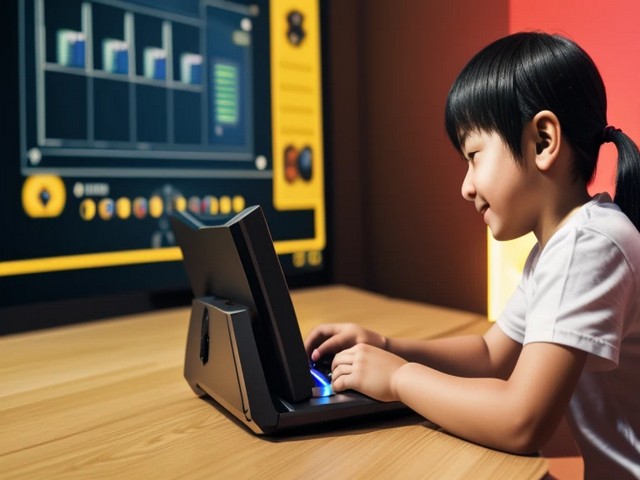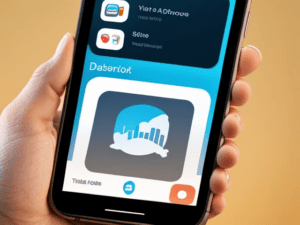
AI in How it is transforming gaming design and the experience of players is an innovative area that you have selected for this assignment that is changing the face of the gaming industry. Today, AI is no longer a concept that is waiting for the future but is actively reshaping the game industry and increasing players’ satisfaction and the level of personalization of the games.
AI in Game Design
AI is now brought into the game creator’s toolbox by giving them new ways of generating more elaborate and lifelike gaming environments. But with the help of AI people can create an interesting and unique environment filled with procedurally generated content or extend the game’s story by adapting to the behavior of the player. This not only makes the gameplay new and exciting but also reduces the time as well as the costs of development immensely.
Enhancing Player Experiences
However, the most profound change of AI in gaming may be said to be its function of optimizing the players’ experiences. Thanks to the big data processing and Machine learning approaches, the AI can recommend personalized experiences to a player who is involved in the game. For instance, AI can enable control of the NPCs’ behavior depending on the players’ activity to enhance the game. This makes players committed and continue playing the games and also seeking more games to play.
Real-Time Adaptation
The real-time nature of adaptation inherent in AI changes the way the games interact with the players. Such features for example, ‘dynamic difficulty,’ make sure that the game is still demanding while at the same time being fun to play for both the occasional player and the more experienced one. AI can scan players’ abilities and alter the degree of the difficulty of the game in real time, thus ensuring that the game is as challenging as it is fun.
Innovative Game Mechanics
Another area where AI is making a profound effect is the core frameworks of the games through inventive game mechanics. It states that the AI algorithms can create puzzles, quests, and challenges unique for each player and adjusted for their playing style and proficiency level. This way, each person is guaranteed an enjoyable time, and the desire to continue playing is prolonged.
The Evolution of AI in Gaming
As to how exactly AI makes the process of video game design as well as the players’ experience far more excellent, the subject has become critical in the video game industry. An area that has greatly benefited is Artificial Intelligence (AI) in that it has been used to improve not only the gameplay but the player experience as well. This technological improvement has led to the development of games that are intelligent in that they adapt in the sense that they feel the needs of the players and even their preferences.
AI in Procedural Content Generation
FCG is one of the most telling examples of how the integration of AI plays a massive role in changing how games are being made. Through the use of AI, game environments can be vast and will always be changing giving every player a different experience. This saves the time of game designers who are in a position to design large and elaborate worlds and spaces without having to model every feature by hand. The aggregate of these factors leads to a constantly shifting environment, which will sustain players’ interest and serve as an incentive for more playing.
Enhancing NPC Behavior
NPCs have received a boost through the assistance of AI in the recent past. This is where current trends in AI help to make the NPCs act more realistic and complex helping you to have some good fun with them. Such characters can now acquire knowledge from the actions of the players, strategize, and give more meaningful challenges thus improving the general gaming experience of the players.
Personalized Player Experiences
AI capabilities of analyzing players’ behavior and choice have contributed to more comparable gaming experiences. At this stage, games can use a player’s play style and/or proficiency to recommend different levels of difficulty, in-app purchases, or other content. This level of personalization helps make the game like a new experience for every player which helps in keeping them engaged.
Improving Game Development Efficiency
AI tools are also transforming how games are being developed over the years. In this way, AI helps developers to free their time and concentrate on more innovative issues of the project. Besides increasing overall production speeds, it also results in better-quality games. Automated testing with the help of artificial intelligence enables us to find out the bugs and possible problems in the program, making the final product more polished.
The Future of AI in Gaming
In the future, AI is sure to take up an even more significant place in the sphere of gaming. More exciting developments in the future include the utilization of Artificial Intelligence to tell and create stories, having soundtracks that alter according to the story being portrayed, and getting real-time emotional responses from the audience. All of these create the potential to enhance the game development and bring new fascinating emotions to game players.
Personalized Player Experiences through AI
Opportunities of AI in game design and the perception of gamers are one of the most discussed subjects within the gaming business. Subsequently, using enhanced algorithms and machine learning processes, skillful developers are designing better gaming experiences. AI application in this transformation works as follows:
Procedural Content Generation
While using AI algorithms, one can generate huge, diverse game spaces and, at the same time, customize the game environments for each player. This not only adds to the overall experience of a gaming session but also makes each time spent on gaming different and unique. The application of AI makes it seem like the content created is specific to a player despite having generated thousands of contents, this is because the player data enables personalization of each content in line with the style of play preferred by the player.
Personalized Gameplay Mechanics
One more important aspect of how AI is changing the nature of games and how people play them is set for players’ special features. Based on his actions and choices during a game, artificial intelligence changes the characteristics of the game to meet the player’s preferences. This real-time adaptation makes it possible to capture the players and pretty much challenge them resulting in real improvement of their experiences.
Adaptive Difficulty Levels
Of course, AI also affects the process of game design and players’ experiences in many ways, including adaptability to difficulty levels. Compared to traditional games, AI can adapt the difficulty level to the player’s ability level, unlike some traditional games that have only one type of difficulty level. This way, it is possible to always maintain the particle of difficulty so that the players do not get annoyed with difficult tasks or on the other side, end up being bored with easy tasks.
Enhanced Storytelling
AI is also affecting the narrative aspect of games in some way. Games employing natural language processing and/or machine learning can provide players with non-linear storylines that adapt to the actions of the former. This brings that closer interaction with the game world and the characters thus making the players have a feeling of actually being in the game.
Behavioral Insights
AI and its role in new approaches to game design and players’ experiences can also be noticed while looking into the aspect of behavioral data. The use of AI in games allows for tracking the activity of players and their behavior and provides the developers with the necessary information on what strategies are effective and which ones are not. In this case, collecting such data assists in the development of better qualities, enjoyability, and appeal of games to more people.
AI-Driven NPCs and Their Impact on Gameplay
Modern developers are using Artificial intelligence in game design and players’ interactions in games through highly complex, AI NPCs. Advanced NPCs are springing up and dominating the different games and they are changing the ways that different players get to enjoy the games.
Enhanced Realism and Immersion
NPCs that implement AI create a sense of true-to-life experiences in games as compared to real life. Many NPCs are capable of learning through machine learning techniques and using thought algorithms that enable them to interact with the players in a real-life-like way.
Adaptive Gameplay and Dynamic Storytelling
Adaptive gameplay is one of the ways AI is transforming games and the experiences players get while using the games. With the help of AI, the behaviors of NPCs can be adjusted according to the player’s decisions and actions; thus, making the game experience different every time. Such an approach to interaction with the player and the fast-paced description of the plot make them interested in the game.
Improved Game Balance and Challenge
NPCs that were developed using AI help in-game balance in that the degree of difficulty posed by NPCs is variable. This will keep the player on his toes but not overburdened to the extent of losing interest in playing the game. The opponents’ actions are observed by AI algorithms that adjust the game’s challenge level in real time to make it pleasant but not too easy.
Expanding Multiplayer and Cooperative Experiences
Then, in multiplayer and cooperative games, NPC can be teammates or adversaries controlled by AI, which is more diverse and, therefore, interesting. Such NPCs can speak, think, bargain, and coordinate with the human players thus enhancing the usefulness and fun of the multiplayer settings.
Real-Time Adaptation and Procedural Generation
One of the interesting topics to try out is how AI is transforming games and their players in the aspects of real-time adaptation and procedural generation. These are AI-based approaches that are revolutionizing the designing of games and how players play them.
Personalized Game Play
Generative games present themselves as one of the ultimate outcomes of artificial intelligence because games can adjust themselves to a particular behavior of a player in real-time. Thus, it is possible to predict the experience of a player and his behaviors, actions, and skill levels and align it with enthusiasm and stable interest by creating outstanding gameplay and diverse narrative arcs. Such an approach guarantees that a player, who is a beginner in playing games as well as an experienced one, will be playable at the same level.
Endless Content Generation
Procedural generation will use AI to generate a seemingly infinite game world that changes with every playthrough. With this, designers can constantly churn out varieties of levels, landscapes, and even stories all possible with algorithms. Second, this not only increases replay ability but also cuts down the replay ability that needs to be written and therefore saves development time and effort. To most of the players, the terrains are novel and they can encounter different issues for every game they will be playing, frequently it will feel like someone made it.
Enhanced Game Worlds
Procedural generation doesn’t end with the generation of terrain or levels in the case of using AI. They can also be used for building large and diverse worlds, filling in NPCs into the created worlds, and crafting complicated quests. Alike, all these work together to create an organic game world that responds to the actions of the players to create unique adventures that are vital.
Dynamic Difficulty Adjustment
Perhaps one of the most astonishing ways through which AI is introducing a shift in game design and the player’s experience is through the use of dynamic difficulty adjustment. The complexity of the game can be managed by the AI and depending on the performance of the player the difficulty level can be changed in real-time. This avoids boredom from too complex sections and keeps interest at a good level as nothing is ever too easy or difficult.
Content Prediction and Generation
Decision-making is another groundbreaking technology in gaming; other notable uses of AI in games include: Engaging and hot content, AI can work based on trends and tendencies that will be preferred by the players. Such an approach helps the developers to remain innovative and consistent with players’ preferences, thus improving the gaming process.
The Role of AI in Multiplayer and Online Games
Where and how AI is transforming gameplay and gamers are one of the most topical questions in the contemporary video game industry. Current gaming experience, particularly that of multiplayer and online games is highly enhanced through the usage of Artificial Intelligence (AI).
Enhanced NPC Behavior
AI introduces new features on how NPCs in the game world will respond, thus enhancing the world’s feel. This is made feasible through machine learning, as it enables NPCs to learn the approaches designed by the players and, therefore, develop unexpected and challenging tactics. It advances the opportunity that the players to run through different situations every time they play.
Personalized Gaming Experiences
It is also changing the way games are developed and played as it incorporates a personal aspect. Soft computing addresses the players ’ behavior and preferences and determines the game content, difficulty, and even the prizes. Such disposition increases player satisfaction especially since more time is spent on a specific game.
Advanced Cheat Detection
AI becomes critical in multiplayer and online games since it can be used to detect cheating and cheating prevention. Thus, by analyzing the game patterns and using statistical methods AI can find the traces of cheating thus, making the gameplay more reasonable and thus more honest, which leads to the improvement in the integrity of the game.
Procedural Content Generation
They allowed procedural content generation of game environments, this is, the generation of new and different game images and levels. This technology enables the developers to come up with large game spaces and environments that are not consciously designed by the developers, which results in better and more diverse games for the players.
Dynamic Difficulty Adjustment
This is another advantage for AI because it can easily change the levels of difficulty as it always takes into consideration the type of players. Analyzing the player level, AI can increase the difficulty level reflecting the game’s complexity but avoiding its setting at a level that will be too difficult to succeed.
Enhanced Social Interaction
Applications such as chatbots powered by artificial intelligence, voice interfaces, and voice recognition are improving social processes in online games. These technologies enable communication between the players, offer help, and at times, may also keep the discussions in order and proper within the framework of healthy gaming.
Analyzing Player Feedback
AI takes the players’ opinions intending to find ways to include or enhance existing games. They refer to the reviews, comments, and actions provided by the players to understand what the players like or disdain, and from this developers can enhance the gameplay and features in use.
Ethical Considerations in AI Gaming
Why and how AI is changing game design and players’ experience can be discussed as raising several ethical questions. This paper aims to present potential problems that may arise in the fight between AI and games and which may affect players or game developers at large. The conflict between creativity and morality can be seen to play a major role in determining the future of the use of AI in gaming.
Data Privacy and Security
The one constraint in How AI is revolutionizing game design and player experiences is the protection and privacy of players’ data. AI systems in some cases need to aggregate large amounts of player data to achieve their optimal performance. Such data may contain personal information and their security should indeed be guaranteed. For this reason, gamers share their account information and other personal information on some sites, developers must ensure the data to prevent breaches and misuse.
Transparency and Accountability
Another area is the openness of AI algorithms. Consumers should know how the AI in games thinks especially in cases of buying in-game content or searching for opponents. There must be ways to check and balance AI decisions because the AI program may be flawed or programmed with a bias. AI systems must be made and checked for prejudice and unfairness to sustain player confidence.
Fairness and Inclusivity
As has been explained, how AI is changing the nature and possibilities of game design and players’ games, raises other questions about justice and equality. The incorporation of AI should improve the gaming experience for any player regardless of his or her status in society. AI algorithms used by developers should be free from any kind of biases that can put players of certain groups out of play or otherwise discriminated against. Social inclusion in certain games brings aboard player acceptance and brings up a powerful player group.
Impact on Mental Health
As mentioned earlier, some research constitutes a ground that should be handled with caution, and the influence of AI-driven games on mental health is one such topic. On the positive side, AI may make gaming even more interesting and on the negative side, people may get addicted to the games. Developers need to incorporate some measures that ensure that gaming is healthy to the user and at the same time, offer a helping hand to those who are potential candidates for becoming addicts.
Autonomy and Control
To an extent, how AI is transforming video games and their designs should not eliminate the concept of players’ agency. Players should always be in charge of their actions that are preceded by AI and AI should always be supplementary. The players must be able to turn off any AI-mediated affordance if they so wish to avoid feeling that their agency in the game has been taken away from them.
Future Trends in AI and Gaming
AI is playing a major role in the creation and the way it is implemented in games which is taking the gaming experience to the next level. The manifestation of AI in gaming is changing the face of gaming in terms of the design of games as well as the relations that exist between users in virtual spaces.



